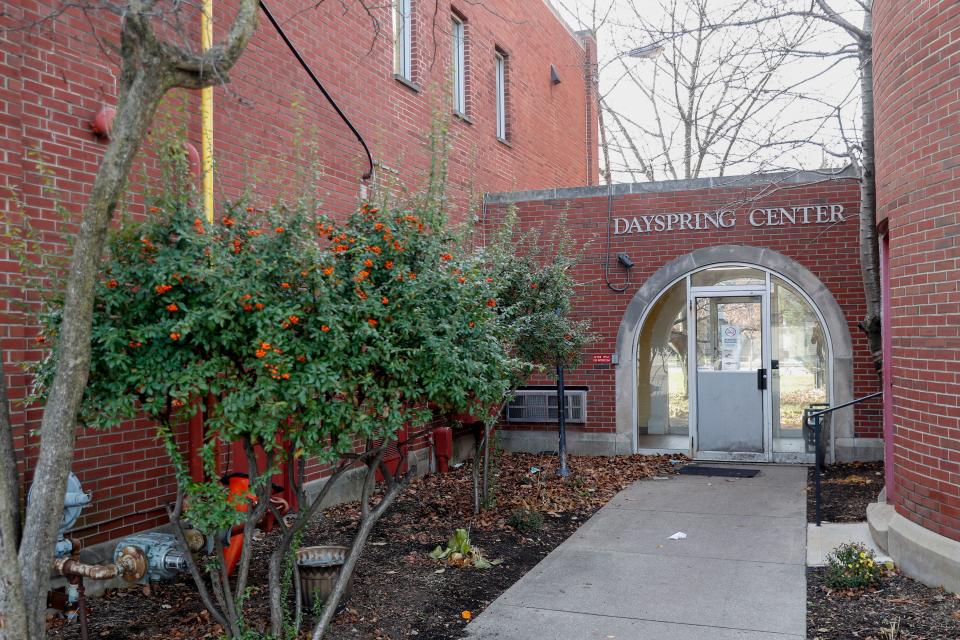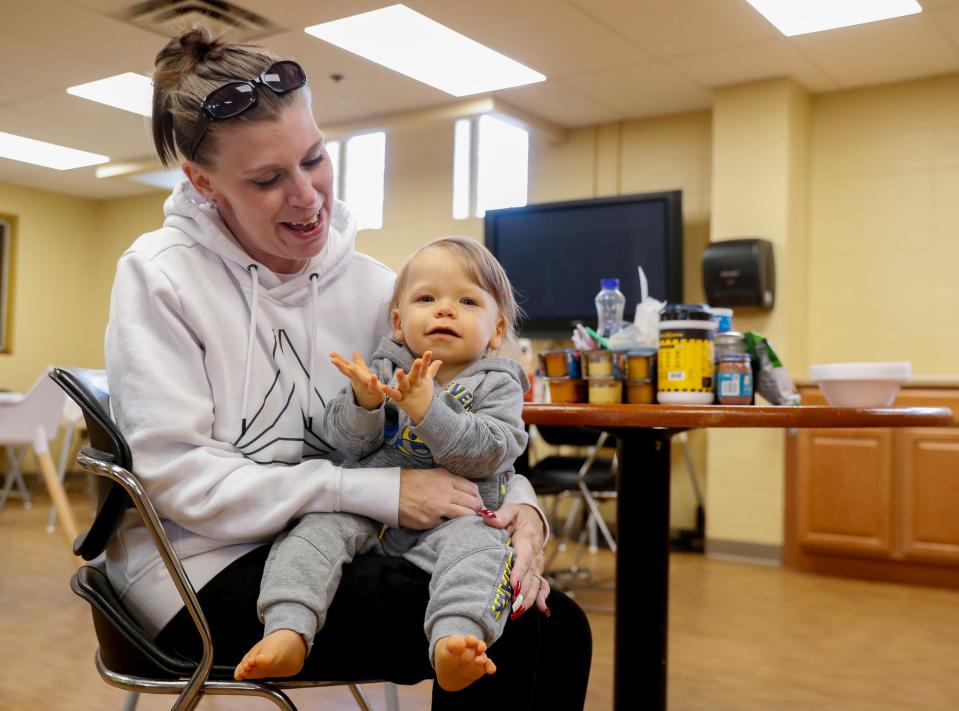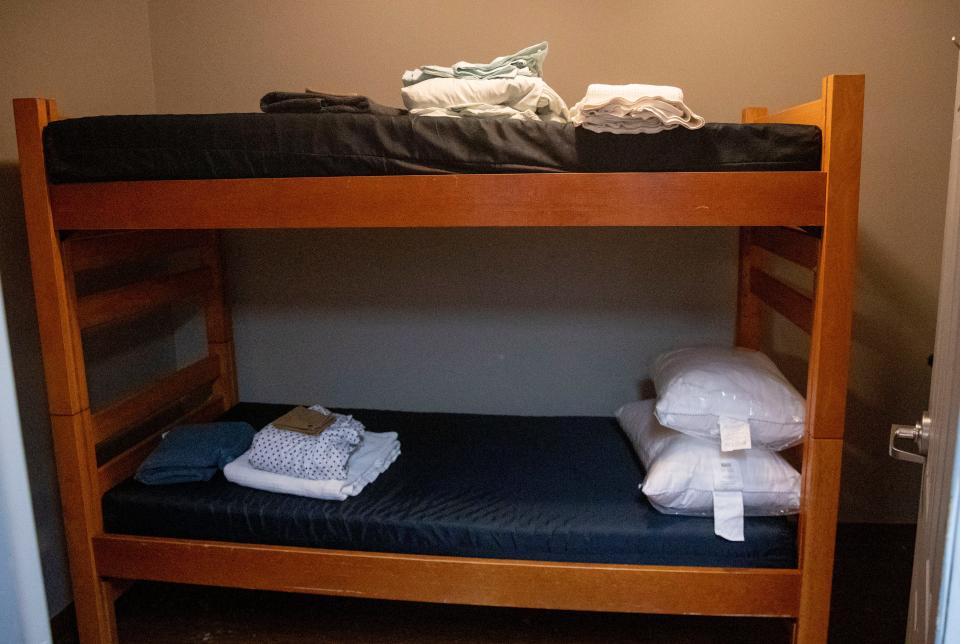Dayspring Center helps families, essential workers fight homelessness
Lori Casson remembers when the little girl whose family had experienced homelessness some 20 years earlier returned to the Dayspring Center as an adult in need of help.
"Mrs. Lori," Casson recalled the woman calling her name.
"It's like uh-oh," she said, reflecting on the moment, "somebody knows me."
Casson said the woman is doing fine now and has a home of her own. But as the executive director of the Dayspring Center, an emergency shelter for families with children, Casson spends her days working to prevent situations like the woman's by addressing the symptoms that lead to homelessness.
She hopes to change the trajectory of the lives of the children who come through the shelter so that they have a permanent home, less of a chance of becoming homeless, and of needing to return as adults.
That can happen. After all, children are greatly impacted by housing instability.
"He or she will also be poor as an adult if we don't break that cycle," Casson said.
Offering more than a Band-Aid
The Dayspring Center opened in 1989. In addition to emergency housing, the center provides basic services such as food and clothing. Staff work to connect each family with resources to address issues that can cause homelessness, such as underemployment or the lack of work, mental health issues, domestic violence and substance abuse.
Staffers also encourage and help families learn to budget or pursue workforce training and educational opportunities.
As part of its programming, the Dayspring Center has a children's services program that works with children from birth to 18 years old who live in the shelter or have stayed there within the past year. A follow-up program allows the center to continuing working with families — sometimes for up to a year or more — depending on their needs.

"We really try not to just put a Band-Aid on," said Casson, a trained social worker who's worked at the Dayspring Center for two tenures totaling about 30 years. She started her second tenure in 2005.
Back in the 90s and early 2000s, families were generally grappling with one issue that had an overarching reach on their lives, she said. Now, many come with a multitude of problems that contribute to their housing instability.
"Homelessness is a symptom and not a cause," Casson said. "You have to do more than to provide housing."

Helping the low-wage worker
Many people don't come to Dayspring Center immediately upon losing their home. They usually experience homelessness for several months or up to a year before entering the shelter, Casson said. During that time, they often move from place to place, staying with their friends, family or in their cars.
Dayspring is able to serve a maximum of 14 families at any one time. The average length of stay is about 45 to 60 days, but the pandemic made that a bit longer.
Because it utilizes dormitory-style housing, the Dayspring Center partnered with an extended stay hotel, located near Pendleton Pike, after the pandemic started so residents could socially distance and isolate if necessary.
"Most of the families that I work with actually do work," Casson said, estimating that about 60-70% are the working poor who don't earn enough wages to comfortably afford all of their basic necessities. Before entering the shelter, many Dayspring families spend the majority of their income on housing or may not have qualified for government benefits.
Casson said the typical story relayed to her is one of a family where a parent has missed work for a couple of days because she or he fell ill or needed to take care of a sick child. The parent isn't working full-time and doesn't get paid time off and, as a result, has less money to put towards rent and food for their family. The situation snowballs.
"They are what you call the essential workers," Casson said. "They're the gas station attendants. They're the Walmart workers. They're the CNAs (certified nurse assistants)."

Anticipating the need during the eviction crisis
COVID-19 has made Casson's job even more complex.
Pre-pandemic, about 1,500 people experienced homeless on any given night in Indianapolis, according to an annual count of the city's homeless population. Roughly 88% of them were staying in transitional housing or emergency shelters.
The city's homeless population soared by 21.4% between 2019 and 2020 during the pandemic. During much of the past year, an eviction moratorium kept some Hoosiers in their homes even as they lost their jobs or wages as result of the pandemic. That's over now, and Casson is monitoring the courts.
With evictions rising, she's expecting the Dayspring Center to see referrals for families in need to rise in the coming months once the winter and tax season pass.
And right now, the calls are starting to increase.
"It's Thanksgiving, it's Christmas, and so people are allowing friends and relatives to stay with them," she said.
After the first of the year, generally most of the Dayspring Center's families will receive a tax refund since they have children, Casson said. That tax refund is often used to provide housing whether it's temporary or not.
"People tend to get in trouble right after tax time, after they have exhausted all of their funds from their tax refund," she said, "then they start to seek shelter elsewhere."

What is your organization’s mission?
The Dayspring Center's mission is to meet the needs of homeless families with children and to connect them with the resources they need.
How many people do you serve?
The center typically serves about 150 to 200 families per year. That generally amounts to 400 to 500 people. Casson said the center can serve 14 families at a time, who stay for 45 to 60 days.
What is your No. 1 need?
Money.
"I'd be a bad executive director if I didn't put that out there first," Casson said. "I always tell people our needs tend to change."
She advises those willing to help to check out the Dayspring Center's website where they will find a needs wish list. Because of the pandemic, the center no longer accepts used clothing.
"If you look on our wish list, we have everything what we need," she said, "from food that we serve our residents — because we do serve about 3,000 meals per month to our families — so food to things that would help us with our budgeting. If I don't have to buy food then that money can be applied elsewhere."
View the wish list at https://dayspringindy.org/donate/wish-list/.
How can people get involved?
The Dayspring Center suspended its volunteer program because of the pandemic. However, Casson said she expects the program will be ramping back up after the first of the year.
"People can always volunteer, whether it's an hour or whether it's an afternoon in different areas or whatever their expertise maybe." she said. "Groups such as congregations and schools — a group of friends — can do a donation drive. Look at the wish list, do a donation drive and bring the things down and we can always make arrangements to pick those items up."
IndyStar Season for Sharing
The shared mission of IndyStar’s Our Children initiative and annual Season for Sharing campaign is to harness the power of journalism to make a difference in the lives of Central Indiana youth. We invite you to join us by making a financial contribution. The Nina Mason Pulliam Charitable Trust will generously match donations up to $25,000. All charitable donations are tax deductible.
This year, grants will be awarded to organizations that have gone above and beyond in serving Central Indiana children and families amid the COVID-19 pandemic.
Go to cicf.org/season-for-sharing to give online. If you prefer to send a check, please mail to: Central Indiana Community Foundation, Attn: Our Children, 615 N. Alabama St., Suite 300, Indianapolis, IN 46204. You also can donate by texting “SHARING” to 80888.
About the Dayspring Center
Mailing address: P.O. Box 44105, Indianapolis, Indiana, 46244
Phone: (317) 635-6780
Website: https://dayspringindy.org/
Email: donation@dayspringindy.org
Contact IndyStar reporter Alexandria Burris at aburris@gannett.com or call 317-617-2690. Follow her on Twitter: @allyburris.
This article originally appeared on Indianapolis Star: Dayspring Center helps families, essential workers fight homelessness

